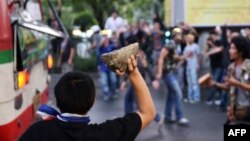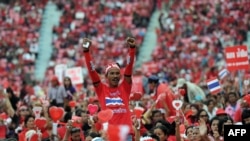BANGKOK —
Thailand's political tensions continue, with Prime Minister Yingluck Shinawatra saying she is willing to hold talks while protesters occupy government ministries and official buildings. The anti-government movement is rejecting the offer but police say one person was shot and killed and at least four wounded in clashses between protesters and government supporters.
Yingluck, Saturday, offered to hold talks with protest leaders in a bid to end the latest crisis in Thai politics.
Thousands of anti-government protesters have been occupying government and ministry buildings, including state communications offices, in a bid to force Yingluck's government from office.
Business leaders and academics have called for both sides to take steps to defuse on-going political tensions.
Thai government spokesman Terrat Ratanasevi says the Prime Minister was willing to have "any kind of dialogue" covering a broad range of stakeholders.
"The prime minister said that the dialogue doesn't have to be started with the prime minister or the government side," said Terrat. "It can be anyone in between that can set up the place or the firm that can invite every party to join including the government, could be protesters and other stake holders."
But the government's offer was rejected by the anti-government movement, an alliance of several groups known as the People's Democratic Reform Committee (PDRC). Akanat Promphan, the movement's spokesman, claims the offer of dialogue was not genuine.
"What we believe the government is trying to do is to engage in dialogue which will result in a never-ending negotiation, like they usually do," he said. "This is a government tactic to divert attention and ease the pressure of the crowds. Now we don't trust that they are genuine in their negotiation."
Thailand's latest political crisis has centered on anti-government charges that former prime minister Thaksin Shinawatra, Yingluck's older brother, maintains excessive influence over the government. Thaksin was ousted in a 2006 coup after five years in power. He fled Thailand in 2008 to avoid a jail term for corruption.
In October instead of a bi-partisan amnesty bill covering minor political activists for political violence in recent years, the governing Pheu Thai members passed an amended blanket amnesty bill covering corruption charges dating back eight years.
Critics claim the bill would enable Mr. Thaksin to return and clear Yingluck's government of any corruption charges linked to populist economic policies. The bill triggered widespread protests and despite the Senate rejecting the bill, the anti-government movement gained momentum.
The rallies, led by former member of parliament Suthep Thaugsuban, call for the government to step aside and allow for a non-elected people's assembly to carry out political reforms before fresh elections. But government members say such an assembly would be unconstitutional.
Amid fears of major clashes between the groups, the pro-Thaksin United Democratic Front for Democracy (UDD) - known as red shirts - has been gathering supporters in Bangkok.
UDD chairwoman Tida Tawornseth says red shirt protesters are prepared to challenge any moves to oust the Yingluck government and anti-government rallies are undemocratic.
"(Dialogue) is very difficult because Suthep is in too far," said Tida. "They want to change the country to other type of politics that's not democratic you see and acts like a revolutionist, like we can say uprising of a group of people. If the government can control the situation we stay here. If the government cannot more will (supporters) will come."
Calls by academics and other leaders to reduce the tensions have so far gone unheeded. Panitan Wattanayagorn, a political scientist and former government spokesman, says a range of solutions have been put forward to end the crisis.
"You have two or three solutions emerging. Of course there is the very interesting political reform again; second is of course negotiation and third is the house dissolution," he said.
While uncertainty remains, analysts say an end to the crisis may occur before the country marks its national day on December 5 - also the Thai King's Birthday.
Yingluck, Saturday, offered to hold talks with protest leaders in a bid to end the latest crisis in Thai politics.
Thousands of anti-government protesters have been occupying government and ministry buildings, including state communications offices, in a bid to force Yingluck's government from office.
Business leaders and academics have called for both sides to take steps to defuse on-going political tensions.
Thai government spokesman Terrat Ratanasevi says the Prime Minister was willing to have "any kind of dialogue" covering a broad range of stakeholders.
"The prime minister said that the dialogue doesn't have to be started with the prime minister or the government side," said Terrat. "It can be anyone in between that can set up the place or the firm that can invite every party to join including the government, could be protesters and other stake holders."
But the government's offer was rejected by the anti-government movement, an alliance of several groups known as the People's Democratic Reform Committee (PDRC). Akanat Promphan, the movement's spokesman, claims the offer of dialogue was not genuine.
"What we believe the government is trying to do is to engage in dialogue which will result in a never-ending negotiation, like they usually do," he said. "This is a government tactic to divert attention and ease the pressure of the crowds. Now we don't trust that they are genuine in their negotiation."
Thailand's latest political crisis has centered on anti-government charges that former prime minister Thaksin Shinawatra, Yingluck's older brother, maintains excessive influence over the government. Thaksin was ousted in a 2006 coup after five years in power. He fled Thailand in 2008 to avoid a jail term for corruption.
In October instead of a bi-partisan amnesty bill covering minor political activists for political violence in recent years, the governing Pheu Thai members passed an amended blanket amnesty bill covering corruption charges dating back eight years.
Critics claim the bill would enable Mr. Thaksin to return and clear Yingluck's government of any corruption charges linked to populist economic policies. The bill triggered widespread protests and despite the Senate rejecting the bill, the anti-government movement gained momentum.
The rallies, led by former member of parliament Suthep Thaugsuban, call for the government to step aside and allow for a non-elected people's assembly to carry out political reforms before fresh elections. But government members say such an assembly would be unconstitutional.
Amid fears of major clashes between the groups, the pro-Thaksin United Democratic Front for Democracy (UDD) - known as red shirts - has been gathering supporters in Bangkok.
UDD chairwoman Tida Tawornseth says red shirt protesters are prepared to challenge any moves to oust the Yingluck government and anti-government rallies are undemocratic.
"(Dialogue) is very difficult because Suthep is in too far," said Tida. "They want to change the country to other type of politics that's not democratic you see and acts like a revolutionist, like we can say uprising of a group of people. If the government can control the situation we stay here. If the government cannot more will (supporters) will come."
Calls by academics and other leaders to reduce the tensions have so far gone unheeded. Panitan Wattanayagorn, a political scientist and former government spokesman, says a range of solutions have been put forward to end the crisis.
"You have two or three solutions emerging. Of course there is the very interesting political reform again; second is of course negotiation and third is the house dissolution," he said.
While uncertainty remains, analysts say an end to the crisis may occur before the country marks its national day on December 5 - also the Thai King's Birthday.





